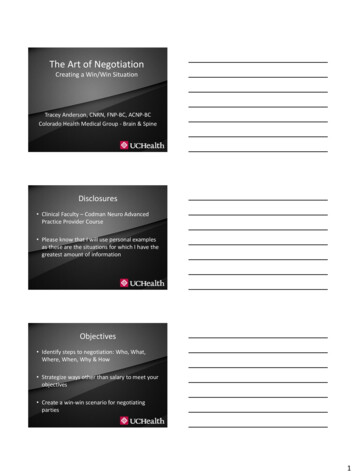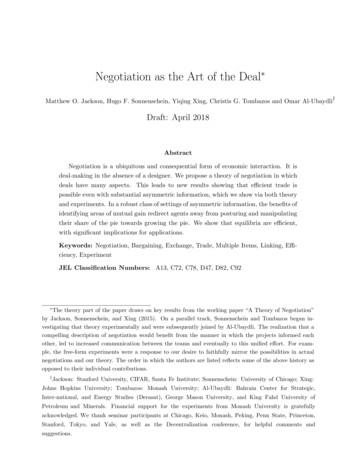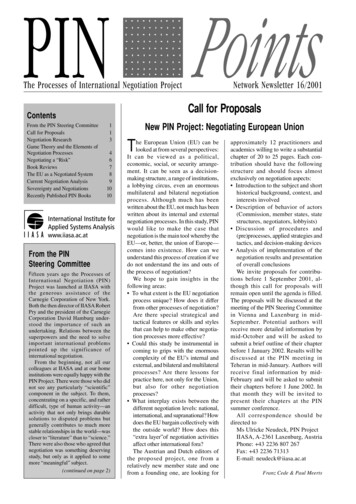
Transcription
The Art of NegotiationCreating a Win/Win SituationTracey Anderson, CNRN, FNP-BC, ACNP-BCColorado Health Medical Group - Brain & SpineDisclosures Clinical Faculty – Codman Neuro AdvancedPractice Provider Course Please know that I will use personal examplesas these are the situations for which I have thegreatest amount of informationObjectives Identify steps to negotiation: Who, What,Where, When, Why & How Strategize ways other than salary to meet yourobjectives Create a win-win scenario for negotiatingparties1
What is Negotiation? A Way of Life! (Herb Cohen, Author, You Can Negotiate Anything) Communication / Interaction of 2 or moreparties with conflicting goals and interestswith the goal to reach agreement orreconciliation People won’t negotiate with you unless theybelieve you can help them or hurt them2
A WORD ABOUT GENDER INEQUITIES Gender Disparities Women still get paid less for same job ( 0.79 to every 1.00 aman earns, 2015 Census Bureau statistics) [Equal in 2059!] Men historically praised for negotiating Women criticized & seen as masculine for negotiating Women have less successful negotiations as a rule– Ellen Pao, Interim CEO of Reddit, no longer allows new hires tonegotiate their salaries because women don’t fair as well as theirmale counterparts Women ask for raises 85% less often than men (Linda Babcock, Professor ofEconomics, Carnegie Mellon University) Surprisingly ––––Women better educated (3 college degrees for every 2 men earn)Women have more masters degrees than men43% of MBAs earned by womenWomen 50% of workforce, only 19% of board of director positionsof S&P 100 companiesWhy Women Struggle with Negotiating Want to be likedDon’t want to be perceived as “aggressive”Want to be part of the teamTend to manage by consensus instead ofautocratic authorityTend to share credit for their success with othersUncomfortable discussing financial matters (Truefor many men as well)Women tend to apologize & over-explainTake “NO” as an absolute3
Some things to consider Being GOOD isn’t enough – not todayMen initiate salary negotiations 4x as often as womenWhen women negotiate, they ask for 30% less than menBiologic reasons for gender differencesWe play same game, different standards for men & womenWomen take blame for things gone badWomen credit fate/others / anything but themselves forsuccessesWomen thrive on “WE”Women have difficulty letting go of defeatsWomen have different social networks & work colleaguesWomen do a lot of invisible workDifferences in StylesWOMENMEN Collaboration Aggression Process Orientation Assertiveness Persuasion Confidence HumilityStanford Business School study showed that women whocan combine female & male qualities do better thaneveryone else, even the men.WHO4
So Who Should be Involved? Do you need someone to negotiate for you?–––––Difficult to be objectiveYou feel less secure when it’s for you than someone elseNegotiation becomes personalPersonal can mean much more EMOTIONALWorry about how others will see you Are you talking to the right person? Is this personempowered to negotiate and finalize the deal? Do you have an advocate who is willing to spend some oftheir social capital on your behalf (NP/PA peer, MD,Administrator, etc.)What About Having a 3rd Party Involved? They can take notes Offer to write up agreement– Include specifics as to conditions under which agreementcan be modified Neutral Party Review– Can spot vague references, omissions, contradictions A written document is imperative! Remember: Don’t argue a position, argue an interest –what is in the best interest of the patient? The team?Recruiters work for whoever is paying them!Who Decides What’s Negotiable? Who has power to define what is negotiable?– Negotiated Order – everything that exists waspreviously negotiated Negotiating “XX” is difficult/different if you arefirst ever to do so, much easier when others havealready done so Learn all you can about the “What” and the“Who”5
WHATYOU CAN’T GET WHAT YOU WANT IF YOU DON’T KNOW WHAT YOU WANTWhat Are Your Objectives? Promotion Salary Increase New Position – Do you have to leave to get what youwant? Better Work-Life Balance More Education More Responsibility Recognition of Current Performance/Duties Equitable Salary Equitable Job Responsibilities Something Different6
Take stock of what you HAVE TitleDuties / ityEtc.Fundamentals of Negotiating What Do You Want?– Not a simple answer for most– Some things are more important than others– Complicated by unspoken, subconscious desires Why Should They Negotiate with You– What do they stand to gain/lose– Doesn’t have to mean inequity/injustice What Are Your Alternatives– What if negotiations fail?– Are you prepared to walk away?– Best Alternative to a Negotiated Agreement (BATNA)BATNA (Best Alternative to aNegotiated Agreement) What you measure any offer against The better your BATNA, the greater your power NEVER enter into a negotiation without options If the employer has multiple BATNAs, you mayhave far less negotiating power Helps you avoid accepting something you shouldwalk away from7
Where do you start? Determine your value– Articulate your skill set (skills inventory/worksheet)– You vs. another NP/PA Do your research– Benchmarking – makes what you’re negotiating forfeel defensible– Build Salary History WorksheetSalary History WorksheetStarting SalaryEnding SalaryDutiesBenefits/PerksWhere do you start? Determine your value– Articulate your skill set (skillsinventory/worksheet)– You vs. another NP/PA Do your research– Benchmarking – makes what you’re negotiatingfor feel defensible– Build Salary History Worksheet– Build Expense Worksheet8
Expense WorksheetExpense CategoryMonthly Debt CoverageLoans/Credit CardsLiving ExpensesGroceries/Clothing/PhoneMedical / DentalCar Payment & GasChild care / Elder careWork RelatedEducation / MembershipsDiscretionary SpendingEntertainment/Travelx12 for annual costs Where do you start? Define yourself/Package yourself– Articulate your skill set (skills inventory/worksheet)– You vs. another NP/PA Do your research– Benchmarking – makes what you’re negotiating forfeel defensible– Build Salary History Worksheet– Build Expense Worksheet Decide your “walk away” point Determine “wants” vs “needs”– Create Compensation Package WorksheetCompensation Package WorksheetI NeedI WANTSalaryBonusRetirement / Profit SharingBenefits: HealthcareBenefits: Vacation/Sick PTOPerks: Title, Office, etc.Intangibles: Schedule,Practice Culture, the 1thing9
Beyond the Pay Negotiations Orientation Plan Patient Care/Practice Expectations––––––How many patients are you expected to seeWhat support will you have (scheduling, MA, RN, etc.)Call requirements & call compensationHospital RoundsWeekendsCoverage when you are away Bonus/Productivity Payment– Formula based on what? (Productivity, Quality, Profit, Patientsatisfaction) Malpractice Coverage – type and limits Non-compete clause Termination clauseCreate the List MUST Haves– Such as: Minimum Salary– Things that if they aren’t there you don’t even beginconversation NICE to Haves– Such as: Office– You may have in current position but don’t feel strongly abouthaving Giveaways– Would be a definite perk but something you can live without –the item that you’re willing to give back as you negotiateDetermining Your Value Impact on– Patient satisfaction– Readmission rate– Infection rate– Complication rate– Length of stay Length of time until you are independent Billing history KNOW your Skill Set! Be able to articulate it!10
Determine Your ValueWhat’s Measurable––––What’s Not MeasurableRVU’sRevenue billed & collectedReadmissions / Complications /- Patient satisfactionWhat AboutNon-billablework?– Physician satisfaction Your own MDs Trauma, ED, Hospitalists, etc.– Customer service Hospital staff Referring Providers Patients– Staff education & training– MentoringExample of Financial Gains:Contribution to Hospital Bottom Line Length of Stay Reduction– Ischemic stroke reduced by 3 days– TIA reduced by 1 day– TOTAL DAYS GAINED 406 Improved coverage of indirect costs by 10% Direct cost reduction of 2.4 millionImpact of Inpatient Heightened awareness and recognition Only2 Inpatient strokes recognized 10/2005-9/2006– No Patients treated w/ tPA– Stroke Alert rollout completed 10/1/2006 46 Inpatient stroke recognized 10/2006-10/2007– 7 patient treated (3-IV, 3-IA, 1-Both)11
Knowing your value means owning your success.Owning your success means acknowledging yourachievements. Bringing attention to yourself, yourideas and achievements means you’ll be scrutinized– that’s ok because it’s hard to get ahead if you’reinvisible. Mika Brzezinski, AuthorKnowing Your Value: Women, Money & GettingWhat You’re WorthWhat About “New Grad” Value? Nursing ExperienceManagement ExperienceProgram Development ExperienceTime Management ExperienceTeaching ExperienceFellowship TrainingSocial Network – one of the most valuable toolsKnow What You Know & Know How to Deal withthe Rest!Do Your Research Do you know what the salary range is for theposition? Do you know what your peers are earning? Do you know what the salary range is for yourregion?– Numerous websites: Vault. ComGlassdoor.comPayscale.comMGMA dataNP & PA organizations salary surveys12
State Adjusted IncomeStateAnnual Mean IncomeCost of Living IndexAdjusted AnnualMean IncomeAlaska 110,875.00133.2California 109,130.00128.7 83,239.49 84,794.09Texas 104,730.0092.8 112,855.91Hawaii 103,375.00164 63,033.54Minnesota 103,265.00101.5 101,738.92Colorado 97,180.00101.3 95,932.87Michigan 93,975.0091.8 102,369.28Wyoming 93,140.0093.6 99,508.55Illinois 84,590.0096.1 88,022.89Mississippi 74,490.0086.9 85,719.22Source: US Bureau of Labor Statistics, Cost of Living retrieved s/states adj income nppaDo Your Research Do you know what the salary range is for the position? Do you know what the salary range is for your region?– Numerous websites: Vault. ComGlassdoor.comPayscale.comMGMA dataNP & PA organizations salary surveys Is the Practice financially sound? Can they afford to hire? What is the Practice’s hiring priority? Consider shadowingWhat is your “Walk Away” Point? Don’t ever negotiate without alternatives Be prepared for consequences of no agreement Know what your BATNA is Don’t let them force you to make a decision– Patience Pays!13
WHERESettings Formal (Actual job search/interview process)––––Office Power PlayOff-site/neutral locationRecruiterIn person vs Skype vs telephone vs email Informal (Casual conversation/not looking for ajob)– Casual conversation with a colleague– Contact you impress– Written on a bar napkin WHEN14
When to Negotiate When you have the time to give it yourUNDIVIDED attention When you can do so without interruption– Work issues– Children/family issues When you are NOT at your current place ofemployment When it’s a good time for youWhen to Pass on Negotiating Physically or psychologically dangerous situation You are too tired, sick, distracted, confused or emotional tonegotiate effectively Issues are trivial or symptomatic of larger issues There are others who can negotiate issues more effectively You perceive no chance of satisfying your needs The other party appears incapable of rationale thought You can gain social points towards a subsequentnegotiation The relationship is critical to you You stand to lose much more than you might gainThe Negotiation Tool Kit, Roger J. VolkemaWHY15
Why / Why Not? To Get What Do You Want! To improve your life– Work/Life balance– Better fit/job satisfaction Because there’s something you want that youdon’t have in your current positionDON’T Negotiate for the sake of doing it!DON’T Negotiate if not interested in position.HOW: STYLES, TACTICS & STRATEGIESNegotiation Styles Competing– Focuses on self-interest or substantive outcome, generally atthe expense of the other party and the relationship Accommodating– Concerned with preserving relationship even if it means givingup substantive outcome Collaborating– Explores individual and mutual interests in an effort to satisfyeveryone’s needs Avoiding– Avoids not only the issues but the other parties and thenegotiations themselves Compromising– Partial win, partial lose – you get some of what you want butnot everything and likewise for the other partyVolkema, The Negotiation Tool Kit16
Negotiation Tactics Exaggerated First Offer Speed Ups Delays Drawing Lines Creating Competition Concessions Investment Authority LimitsNegotiation Tactics, cont. Silence Playing Dumb Bundling Confederates Good Cop, Bad Cop Split the DifferenceWays Other than Salaryto meet your Goals More education money– Tuition reimbursement– Conference money and time off to attend Flexible Schedule / 4 day work weekVacation timeBonus ProgramSecondary Title/DutiesCell Phone/iPadCall stipend / removal of call as a requirement17
Important Take-home Pearls Enlist helpNO doesn’t always mean NOHonest & Open Communication is usually bestGet it in writingIt’s ok to take time to “think about it”Grass isn’t always greener somewhere elseSo Now What 1. Define What You WANT2. List What you NEED / HAVE / CAN’T LIVEWITHOUT3. Define your ASSETS – What do you bring tothe negotiation?4. Decide STAY or GO5. Start Negotiating!References Perfecting Your Pitch: How to Succeed In Business & inLife by Finding Words that Work. Ronald M. Shapiro(with Jeff Barker), 2013. ISBN 978-1-59463-201-3. Negotiating at Work: Turn Small Wins into Big Gains.Deborah M. Kolb & Jessica L. Porter, 2015. ISBN 978-1118-35241-0. The Confidence Code: The Science & Art of SelfAssurance – What Women Should Know. Katty Kay &Claire Shipman, 2014. ISBN 978-0-06-223062-1. The Negotiation Tool Kit: How to Get Exactly What YouWant in Any Business or Personal Situation, Roger J.Volkema, 1999, ISBN 0-8144-8008-X18
References The Wall Street Journal: Guide to Building Your Career,Jennifer Merritt, 2012, ISBN 978-0-307-71956-0. Knowing Your Value: Women, Money and Getting WhatYou’re Worth, Mika Brzezinski, 2010, ISBN 978-160286-134-3. You Can Negotiate Anything: How to Get What YouWant, Herb Cohen, 1980, ISBN 0-8184-0305-5. Perfect Phrases for Negotiation Salary & Job Offers,Matthew J. DeLuca and Nanette F. DeLuca, 2007, lth.orgThank You!19
(Herb Cohen, Author, You Can Negotiate Anything) Communication / Interaction of 2 or more parties with conflicting goals and interests with the goal to reach agreement or reconciliation People won’t negotiate wi










